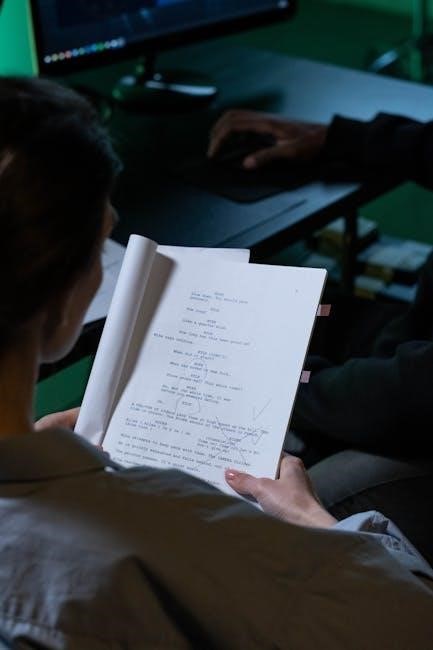The Fair Play script by Chloe Domont explores the cutthroat hedge fund world, where a young couple’s relationship is tested by ambition and power struggles.
1.1 Overview of the Fair Play Screenplay
The Fair Play screenplay, written by Chloe Domont, delves into the complexities of a young couple navigating the ruthless world of hedge funds. The story explores themes of ambition, power dynamics, and relationship strain. Set against the backdrop of a cutthroat financial environment, the script examines how professional success impacts personal bonds. With sharp dialogue and a gripping narrative, Fair Play offers a thought-provoking look at modern workplace challenges and gender roles, making it a compelling read for those interested in character-driven dramas.
1.2 Importance of the Fair Play Script PDF
The Fair Play script PDF is a valuable resource for filmmakers, writers, and enthusiasts. It provides insight into Chloe Domont’s storytelling style, character development, and dialogue crafting. The script’s exploration of themes like ambition and gender roles makes it a significant study material for understanding modern storytelling. Additionally, its availability online allows easy access for those interested in analyzing the narrative structure and character dynamics. This PDF is a must-read for anyone looking to gain insights into contemporary screenwriting and its cultural relevance.
Plot Summary of Fair Play
Set in a ruthless hedge fund, Fair Play follows a young couple whose relationship is strained by an unexpected promotion, leading to power struggles and emotional turmoil.
2.1 The Story of a Young Couple in a Hedge Fund
The screenplay centers on Emily and Luke, a young couple navigating the high-stakes world of a hedge fund. Their relationship is put to the test when Emily receives an unexpected promotion, creating a power imbalance that strains their bond. As they grapple with ambition and identity, the cutthroat environment exacerbates tensions, leading to a volatile exploration of love, loyalty, and professional rivalry.
2.2 Key Conflicts and Turning Points
The screenplay hinges on Emily’s unexpected promotion, which sparks tension and resentment in her relationship with Luke. Their power dynamics shift, leading to confrontations that expose deeper insecurities. A pivotal moment occurs when Emily’s success overshadows Luke’s struggles, causing friction and jealousy. Their relationship reaches a breaking point as they confront the consequences of ambition and identity. These turning points escalate the emotional stakes, highlighting the fragility of their bond and the ruthless nature of their professional world.

Themes in Fair Play
The screenplay explores themes of ambition, power dynamics, and gender roles, delving into how societal expectations and professional pressures impact relationships and personal identities.
3.1 Exploration of Gender Roles
The Fair Play script delves into the complexities of gender roles, particularly in a high-stakes professional environment. Emily, the female lead, navigates a world dominated by male privilege, facing subtle yet pervasive biases. Her journey reflects the struggles women encounter in competitive industries, where assertiveness is often misconstrued. Meanwhile, Luke’s character embodies traditional masculine ideals, creating tension in their relationship. The screenplay critiques societal expectations and how they shape individual ambitions, offering a nuanced commentary on gender dynamics in both personal and professional spheres.
3.2 Ambition and Its Consequences
The Fair Play script examines the darker side of ambition, set against the backdrop of a ruthless hedge fund. Emily’s unexpected promotion triggers a power shift, straining her relationship with Luke. The screenplay highlights how relentless pursuit of success can erode trust and intimacy. As both characters navigate their ambitions, the story reveals the personal sacrifices and moral compromises that accompany upward mobility. Domont’s script serves as a cautionary tale about the costs of unchecked ambition in a hyper-competitive world.
3.3 The Dynamics of Relationships
The Fair Play script delves into the intricate dynamics of relationships, particularly between Emily and Luke, as they navigate power struggles and shifting roles. Emily’s rise in the hedge fund challenges their partnership, creating tension and resentment. The screenplay explores how professional ambition can strain personal bonds, leading to questions of loyalty and trust. Through their interactions, Domont highlights the nuanced interplay of love, competition, and communication, revealing how relationships evolve under pressure.

Character Development
The Fair Play script intricately explores character development, highlighting the complexity of Emily and Luke as they navigate personal and professional challenges, revealing multi-dimensional personalities and growth.
4;1 Emily: A Complex Female Lead
Emily, the female protagonist, is a deeply nuanced character whose ambition and vulnerability are masterfully portrayed. As she navigates the ruthless hedge fund environment, her determination clashes with societal expectations, revealing a multifaceted personality. Her journey explores themes of identity, power, and relationships, making her relatable yet flawed. Through her struggles, the script delves into gender dynamics and personal growth, showcasing Emily’s resilience and emotional depth. Her character serves as a powerful commentary on modern workplace challenges and the complexities of female ambition.
4.2 Luke: The Male Counterpart
Luke, Emily’s partner, is portrayed as a driven and ambitious individual navigating the cutthroat hedge fund world. His character reflects the pressures of a competitive environment and the strain it places on relationships; As the story progresses, Luke’s actions and decisions reveal his emotional depth and the complexities of his partnership with Emily. His role challenges traditional gender roles and highlights the nuances of power dynamics in both personal and professional settings, making him a compelling and multifaceted character in the narrative.

Screenplay Structure
The screenplay follows a three-act structure, building tension through the couple’s power struggles and evolving dynamics, with crisp dialogue, pacing, and rich thematic depth.
5.1 The Three-Act Structure
The screenplay adheres to a classic three-act structure, expertly pacing the narrative. Act 1 introduces the young couple in the ruthless hedge fund world, setting up their dynamic. Act 2 escalates tensions as ambition and power struggles disrupt their relationship, with pivotal conflicts and emotional turning points. Act 3 resolves the fallout, exploring the consequences of their choices and the future of their bond; Chloe Domont’s structured approach ensures a gripping, emotionally resonant story that maintains tension and character growth throughout.
5.2 Dialogue and Character Interactions
The dialogue in Fair Play is sharp and revealing, capturing the emotional depth of the characters. Conversations between Emily and Luke are laced with tension, reflecting their evolving relationship. The script uses dialogue to expose their ambitions, insecurities, and shifting power dynamics. Domont’s writing ensures that every interaction feels nuanced, driving both character development and the plot forward. The exchanges are often charged with unspoken emotions, making the characters’ struggles and connections deeply relatable. This aspect of the screenplay highlights Domont’s skill in crafting realistic, compelling interactions.

Chloe Domont: The Writer
Chloe Domont is the talented writer behind Fair Play, crafting a compelling narrative that delves into ambition, power, and relationships in a cutthroat hedge fund setting.
6.1 Background and Inspiration
Chloe Domont, a rising talent in screenwriting, drew inspiration from her observations of gender dynamics and power struggles in professional settings. Her background in storytelling and interest in exploring complex relationships influenced the creation of Fair Play. The script reflects her keen insight into the cutthroat world of finance and the personal costs of ambition, blending realism with gripping drama to captivate audiences and spark meaningful conversations about modern workplace challenges and societal expectations.
6.2 Her Writing Style
Chloe Domont’s writing style in Fair Play is sharp, nuanced, and incisive, blending biting dialogue with a keen understanding of human dynamics. Her script captures the cutthroat nature of the hedge fund world while delving into the emotional intricacies of her characters. Domont’s ability to balance tension with vulnerability makes her storytelling both gripping and thought-provoking. Her prose is concise yet evocative, ensuring that every line contributes to the overall narrative’s momentum and emotional depth.
Fair Play and Its Cultural Relevance
Exploring themes of ambition, power, and gender roles, Fair Play resonates with modern societal discussions, offering a stark look at workplace dynamics and relational challenges.
7.1 Representation of Modern Workplace Issues
The Fair Play script vividly portrays the cutthroat environment of a hedge fund, highlighting themes of ambition, power struggles, and gender dynamics. It explores how professional advancement can strain relationships and challenge traditional roles. The story delves into the pressures of competitive workplaces, where success often comes at a personal cost. By focusing on a young couple navigating these challenges, the script offers a relatable lens through which to examine modern workplace issues, particularly the intersection of gender and ambition in high-stakes industries.
7.2 Discussions on Gender Stereotypes
The Fair Play script delves into gender stereotypes, particularly in the competitive hedge fund industry. It challenges traditional roles by portraying a woman’s struggle for equality in a male-dominated field. The story explores how societal expectations shape relationships and career dynamics, offering a nuanced commentary on gender biases. Through its characters, the script highlights the pressures faced by women to balance professional ambition with personal identity, sparking important conversations about equality and representation in modern society.

Where to Find the Fair Play Script PDF
The Fair Play script PDF is available for free download on 8FLiX and other trusted sources, providing easy access to Chloe Domont’s compelling screenplay.
8.1 Official Sources for Download
The Fair Play script PDF can be downloaded from official sources like 8FLiX, ensuring a legal and high-quality copy of Chloe Domont’s screenplay. These platforms are reliable and offer easy access to the full script, making it convenient for readers to study and analyze the story. Always opt for verified websites to avoid unauthorized or incomplete versions. This ensures you get the authentic content as intended by the writer.

Similar Plays and Scripts
Fair Play shares themes with works like My Fair Lady and Fair Game, exploring societal dynamics and personal ambition, yet offers a fresh, modern perspective on relationships and power struggles.
9.1 Comparisons to My Fair Lady and Other Works
While Fair Play and My Fair Lady differ in setting, both explore themes of societal expectations and transformation. My Fair Lady delves into class and identity, whereas Fair Play examines gender roles in professional contexts. Both scripts feature strong female leads navigating male-dominated worlds, with dialogue that highlights power dynamics and personal growth. The character-driven narratives in both works emphasize the tension between societal norms and individual ambition, offering timeless commentary on human relationships and societal structures. These parallels underscore the universal relevance of their themes.
The Fair Play script offers a thought-provoking exploration of ambition, power dynamics, and gender roles, making it a significant commentary on modern relationships and workplace culture.
10.1 Final Thoughts on the Fair Play Script
Chloe Domont’s Fair Play script delivers a compelling exploration of gender roles, ambition, and relationship dynamics within a cutthroat hedge fund setting. The story masterfully portrays how professional advancements strain personal bonds, offering a fresh perspective on modern workplace challenges. Domont’s writing style is both sharp and introspective, making the script a must-read for those interested in contemporary narratives. With its cultural relevance and thought-provoking themes, Fair Play stands out as a significant work in today’s literary landscape.
